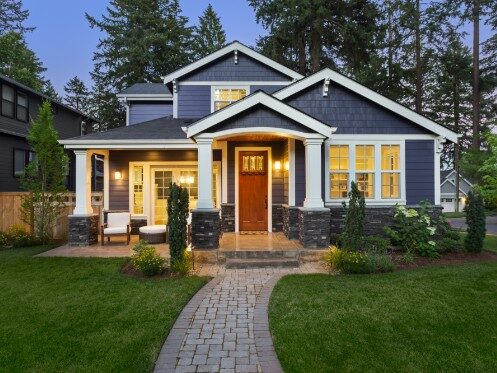LED lighting has become increasingly popular in recent years because it offers multiple advantages compared to traditional light fixtures. Its affordability, energy efficiency, and long-term reliability have made it a go-to option for many home and business owners. While LED lighting is relatively simple to use and maintain, some common questions still arise. Here’s a look at some of the most common LED lighting questions:
What Are the Most Common Sizes for LED Bulbs?
Typical LED bulb sizes range from A19 and PAR20 to BR30 and MR16. A19 bulbs are the most common for general home lighting, while PAR20s and BR30s are great for spotlights and floods. MR16s are typically used for accent lighting in art galleries or display cases. Other sizes may also be available depending on the type of fixture. As you select an LED bulb, ensure a proper fit in the fixture. If in doubt, consult a professional to be sure.
When choosing a bulb, remember to check the wattage rating and lumens output. Bulbs with higher wattages produce more light, while bulbs with lower wattages tend to be dimmer. The lumens output is an important factor in determining brightness.
What Are the Advantages of LED Lighting?
LED lighting offers several advantages when compared to traditional light fixtures. These benefits include lower energy costs, longer lifespans, and more reliability. LEDs also produce less heat than incandescent bulbs, making them safer and more energy efficient.
LEDs also offer greater design flexibility than traditional fixtures because they come in various shapes, sizes, and colors. This makes them ideal for accent lighting or creating unique effects.
One of the most important benefits of LED lighting is energy efficiency. LEDs use up to 80% less energy than incandescent bulbs, making them an ideal choice for anyone looking to save money on energy bills.
What Is the Difference Between LED and CFL Lighting?
LEDs differ from CFLs (compact fluorescent lighting) in several ways. LEDs typically last much longer than CFLs, with some lasting up to 50,000 hours or more. CFLs usually last between 6,000 and 15,000 hours. LEDs also produce less heat than CFLs, making them a safer option for many applications. LEDs are more affordable than CFLs, making them a top choice for budget-conscious buyers.
What Is the Best Wattage for LED Lighting?
The best wattage for LED lighting depends on the application. Generally speaking, you should look for a bulb with an output of 500 lumens or more for general lighting and up to 1000 lumens for task lighting.
For outdoor lighting, you should look for bulbs between 10 and 50 watts. This wattage will provide enough illumination without being too bright or too dim. It’s best to consult a professional if you’re unsure which wattage is appropriate for your space.
Are LEDs Safe?
LED lighting is safe to use in most cases. LEDs use minimal electricity and produce little heat, making them safer than traditional bulbs. However, like traditional bulbs, LED bulbs as they can be fragile. Follow the manufacturer’s instructions and wear protective gear to avoid accidents when installing LED fixtures.
Some LED lights are used in skin treatments or medical diagnostics due to their low levels of UV radiation. In addition, most LED lights are free from mercury and other toxins, making them a favorite choice for eco-friendly lighting.
Are LED Lights Dimmable?
LED lights are dimmable. However, not all LED lights will work with a standard dimmer switch. To ensure compatibility, check the label of the LED light to make sure it is dimmable. If not, you may need to purchase a separate compatible dimmer switch.
It’s also important to check the wattage rating of the LED light. Some dimmers may not be compatible with lights with high wattage levels, so verify this before purchasing your bulbs.
Do LED Lights Need Special Fixtures?
Most LED lights do not need unique fixtures. Check the bulb’s specifications before purchasing because some fixtures may require special mounting or wiring. If you’re unsure which type of fixture to use with your LED bulb, consult a professional for advice.
If the mounting base is not compatible, you may need to purchase a special adapter for the LED bulb. Doing this will ensure the bulb is securely mounted and won’t become a safety hazard.
What Is the Lifespan of LED Lights?
The lifespan of LED lights can vary depending on the bulb type and how it is used. Generally speaking, LED bulbs last more than 50,000 hours. The higher quality bulb you purchase, the longer it will last. It’s also important to note that LED bulbs can dim as they reach the end of their lifespan.
To ensure your LED lights maintain their lifespan, follow the manufacturer’s instructions when installing and using them. You should also consult a professional if you’re unsure which type of LED light is best for your application.
Can I Use LED Lights in Wet Areas?
Yes, you can use LED lights in wet areas such as bathrooms and outdoor spaces. However, you should purchase a waterproof or water-resistant LED light for these areas. Doing this will ensure the bulb is protected from moisture, which could decrease its lifespan.
As you shop for LED bulbs, look for IP-rated lights that specify whether they suit wet areas. Lights with a higher IP rating will be more waterproof and are appropriate for areas with high moisture levels.
For additional safety, you may want to avoid using LED lights in pools or hot tubs. To light up these areas, you should use sealed fixtures specifically designed for water use.
Do LED Lights Have Greenhouse Gas Emissions?
No, LED lights do not emit greenhouse gases. Compared to traditional bulbs, LEDs use less electricity and produce less heat, making them a more efficient and eco-friendly lighting option. LEDs also contain no toxic chemicals or metals, so they are an ideal choice for people looking to reduce their environmental impact.
Can LED Lights Get Hot?
Yes, LED lights can get hot. The heat generated by the LEDs typically dissipates through a built-in cooling system. It’s important to ensure the LED lights you purchase have a suitable cooling system because heat buildup can cause the LEDs to fail prematurely. In addition, check your fixtures to determine if you are using ones designed for LED lights, as some may not be able to dissipate the heat adequately.
Ultimately, LED lights are an excellent choice for any residential or commercial application. If you need help selecting or installing LED lights, consult Home Huft Services for advice. Our electrical services include indoor and outdoor lighting, electrical wiring, panel upgrades, generators, and surge protection. We also offer HVAC installation, repair, and maintenance, ductless AC, heat pumps, indoor air quality services, and plumbing services. Contact Home Huft Services today for more information about LED lighting or any other service we offer!



